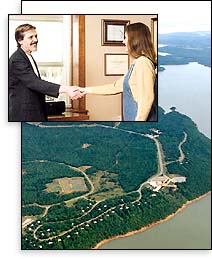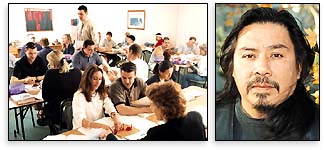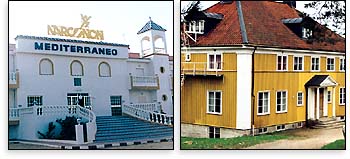
|

Regaining Life and Happiness
By Marc Steven
Rehabilitation program achieves miracles daily for those suffering addiction to drugs or alcohol.

|
 |
New site of the Narconon New Life Center on Lake Eufala in Oklahoma, a facility for drug rehabilitation and for training staff from the many Narconon programs located in 29 countries around the world.
|
 |

f the almost 14 million people abusing drugs in America today, about one million will make a serious attempt to kick the habit this year. Of these, only 15 percent will make it. The other 85 percent will revert because most rehabilitation centers not only lack workable methods to bring addicts through cravings, but because they fail to address the underlying reasons individuals turn to drugs.
The bitter truth is that, once addicted, the vast majority of drug and alcohol abusers become trapped in a downward spiral that leads to a single, inevitable end.
It was the remarkable recovery from such a life-threatening addiction that resulted in 1966 in the creation of a method of drug rehabilitation described by many as the most effective in the world. The late Willie Benitez, then an addict and inmate in a state penitentiary in Arizona, ran across a book by author and humanitarian L. Ron Hubbard containing principles about life, the mind and the spirit. Benitez applied simple truths he learned and freed himself from his addiction.
Benitez told others about his experience, and turned to help fellow inmates who were addicts. He corresponded extensively with Mr. Hubbard, and in short time, Narconon — meaning, literally, “no drugs” — was formed, using a range of Mr. Hubbard’s discoveries to address virtually all of the complexities of addiction for people from all walks of life and of all races and creeds. While Mr. Hubbard is well known as the founder of the Scientology religion, the Narconon program is autonomous and secular — although it has been supported from the outset by many Scientologists.

|
 |
(Left) Students on the Narconon program in Oklahoma. (Right) After beating a 25-year drug habit, Greg Littlewalker joined Narconon staff to help other addicts to recover. |
 |
The results were startling. Narconon centers soon documented that between 70 and 84 percent of addicts who completed the program returned to society as contributing members, and never looked back.
Likewise Benitez and Narconon never looked back, and with 70 centers in 29 countries today, the program has achieved international acclaim for its success rate in freeing addicts from the chains of drugs and alcohol.
One such gateway to freedom is Narconon of Oklahoma — also known as the Narconon New Life Center.
Of all Narconon centers, the environment of Narconon New Life Center is unique, due to the presence of several Native American tribes. Staff see first hand the devastating effects of drugs on the Plains Indian community.
“Key to Their Condition”
“I estimate that 75 percent of the reservations are abusing substances,” said Tony Arkeketa, a retired graphic artist who moved back to his Ponca tribal community in 1986 where he works as Property Procurement coordinator for the Otoe Missouria tribe.
Inhaling paint, a cheap but lethal high, is rampant among the tribes. Extended abuse of paint results in severe brain and nerve system damage, making rehabilitation difficult.
Even under these circumstances, nearly half of the Native Americans who complete the Narconon drug rehabilitation program at the Narconon New Life Center do not return to substance abuse.
“While the reality of their situation is daunting,” acknowledges Gary Smith, Director of the Narconon New Life Center, “they are very aware that the drug and alcohol problem is key to their condition.” Smith understands the problem, having been a hard-core heroin addict himself who kicked the habit 26 years ago through Narconon.
Returning Life
Native Americans who share the certainty of Narconon’s results are program graduates who joined staff of the Narconon center to help other addicts.
Greg Littlewalker started with tobacco at 13, followed by alcohol six months later. He was soon taking amphetamines, barbiturates, LSD and cocaine, with alcohol — a deadly combination that he continued for 25 years. He made several attempts to stop but he could not find a rehabilitation program that worked for him.
“One day a jailer told me, ‘Greg, you don’t have to sit in this jail every weekend for driving under the influence, or for walking the streets when you’re drunk and half out of your mind, putting yourself in danger,’” said Littlewalker. “He said, ‘You can go to Narconon.’”
Littlewalker eventually took the jailer’s advice, after he had left his family and was living on the streets. “When I arrived at Narconon, I told the staff, ‘If I leave here now, I’ll die within two weeks,’” he said.
He not only lived, but embarked on an entirely new life. “The program put life back in me,” he said. He joined the staff of Narconon because “I couldn’t have this new life unless I shared it and helped others who felt the way I had before.
“I used to think that society owed me something,” he said. “Society never owed me anything; society was there for me to accomplish things, and now I can do that.”
Top Recommendation
The Narconon program, which takes an average of four to six months to complete, consists of a series of steps that include detoxification involving withdrawal, sauna, exercise and good nutrition with medical oversight, along with a series of studies and exercises that enable addicts to get back on top of their lives. (See Narconon: A Workable Program.)

|
 |
70 Narconon facilities exist in 29 countries from Mexico to Taiwan; among them are Narconon Mediterraneo (left), one of three facilities in Spain, and Narconon Sweden. |
 |
The Narconon New Life Center’s 58 staff service up to 105 people at any one time. A recent inspection by the Rehabilitation Accreditation Commission against nearly 200 standards for administration and program procedure resulted in accreditation for a further three years — the maximum obtainable. Narconon complied with nearly every one of the requirements, several of which they passed with extraordinary standards. The center has the longest history of accreditation with the commission as a residential drug rehabilitation facility in the state.
International Response
75% of Narconon graduates have remained drug-free two years after completion of the program.
|
|
Staff of Narconon in Oklahoma have had hundreds of such reminders since the Narconon New Life Center opened in 1990, strengthening their determination to make a major impact on drug abuse.
With the explosion of the World Wide Web, the center went online on the Internet in 1996, with overwhelming response.
In addition to providing information, the Narconon New Life Center has Intake Counselors who respond to requests for help over the Internet; addicts arrive to Oklahoma as a result from everywhere and every walk of life — from a London hairstylist and a New York supermodel to a Boston Hells Angel.
Counselors trained on the Narconon program may also be granted official accreditation as Certified Chemical Dependency Counselors.
Over recent years, doctors, registered nurses, other medical personnel and professionals in the drug rehabilitation field have trained on the Narconon program.
“That’s a major part of what we’re all about — making training in Narconon’s methods available,” said Gary Smith. “People don’t have to go to school for 20 years, because we can’t wait around to win the war on drugs — we have to get going now.”
Training has been done of staff from existing Narconon centers as well as teams to open new centers in 15 nations, including Canada, Mexico, Colombia, Brazil, Russia, New Zealand, Australia, Taiwan and Japan.
No Better Validation
As one indication of its success, follow up studies have found that 75 percent of the graduates from the Narconon New Life Center have remained drug-free two years after completion of the program.
Further, a growing number of courts are sending drug offenders to do the Narconon program as an alternative sentence to going to prison.
No one speaks as much of success, however, as those who have completed the program, like Littlewalker, or those who are family or close friends of graduates.
“Words are definitely not enough to express my gratitude to you for saving my son’s life,” wrote one mother of a Narconon New Life Center graduate. “Until six months ago, I would often sit by the phone in the middle of the night, crying and praying I would not receive a call from the police or worse yet, the morgue, telling me that John was in jail again, or dead. John had been addicted to heroin for many years.
“We tried treatment program after treatment program and nothing seemed to work for my son.
“John graduated from Narconon three months ago. I have never seen him as happy as he is now. He is back in college and doing well. He has confidence in himself again. Thank you, thank you, thank you.”
Once graduates like John leave the Narconon New Life Center, staff monitor their progress in returning home and becoming contributing members of society, assisting them as needed. Others, as evidenced throughout the Narconon New Life Center’s spacious facilities, decide not to leave, but to join Narconon staff and return the gift of life to others.
“When you have someone who was in pain, who has been able to get themselves together and who has said, ‘I want to share this with others. I want others to have this experience. I want others to be as successful as I was and I’m going to stay here,’ “ said Dr. Emery Johnson, Assistant Surgeon General of the United States (ret) and former director of the U.S. Indian Health Service in an interview for Narconon, “I don’t know of any better validation that you can have from your people who have gone through your program.”
For more information, visit www.stopaddiction.com or call 1-800-468-6933.
|

|





